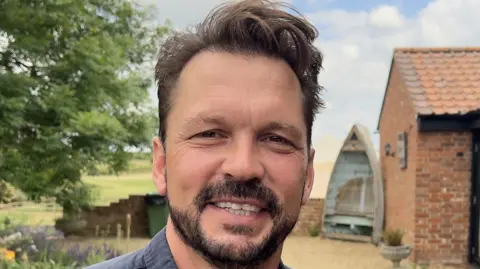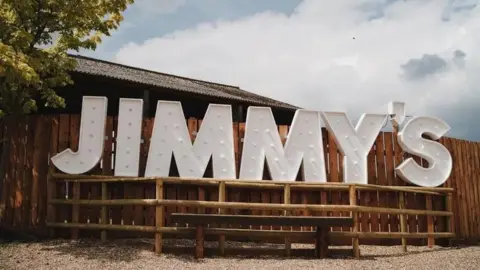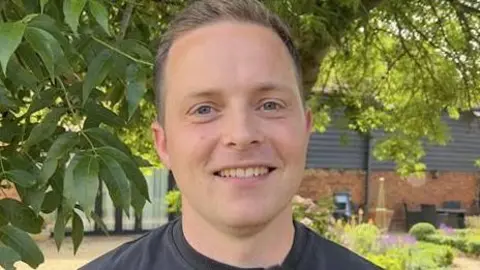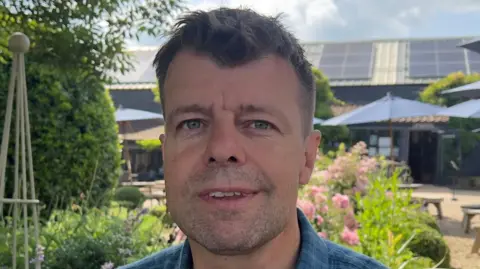Zoos much more than entertainment, say leaders
 John Fairhall/BBC
John Fairhall/BBCZoo and wildlife park leaders at an annual conference have said the industry is "much more than entertainment" in today's world.
The British & Irish Association of Zoos and Aquariums met at Jimmy's Farm & Wildlife Park near Ipswich for its annual conference, bringing together representatives from across the industry.
It comes after the government introduced new legislation to raise standards and ensure conservation efforts were being evidenced.
Jimmy Doherty, owner of Jimmy's Farm and TV presenter, said the industry should "always be striving to do better".
"The days of when you got to a zoo or a wildlife part for entertainment, they're still there to have a day out, but it's much more than entertainment," he said.
"I'm very keen to get that across to people because there still is an anti-side to it, but actually the work that zoos and wildlife parks do to preserve our wildlife and habitats is vital.
"Particularly now under so much pressure, in terms of destruction of habitats, but also climate change."
 Jimmy's Farm
Jimmy's FarmMr Doherty's farm and wildlife park is home to four polar bears as well as many other animals.
One of the polar bears was rescued by Jimmy's Farm from Sweden as it was due to be euthanised.
The park is also a part of various breeding programmes and conservation research projects.
He encouraged people to find out more about all zoo's conservation work and he believed the new government legislation would ensure standards were kept high.
The legislation updates rules for keeping animals in zoos, including having larger habitats for elephants, the removal of being able to touch fish and cephalopods at aquariums, and phasing out the practice of tethering birds.
Animal welfare minister Baroness Hayman said the reform was "long overdue".
"We're making sure all sectors have the tools they need to thrive, which is vital in our mission to deliver economic growth and make lives better for people across the country under our Plan for Change," she said.
 John Fairhall/BBC
John Fairhall/BBCTyler Whitnall, a director of Hertfordshire Zoo and a trustee of Big Cat Sanctuary in Kent, said the new legislation would "bring everyone to a higher table".
He added: "[It will] hold everyone to a much higher standard to protect the species in our care, but also what we're doing for conservation in terms of protecting these species in the wild.
"But also in terms of making sure our teams on the ground are looking after the animals, have the right information and are accountable, so we can make sure that zoos going forward are all good zoos.
"Without the work that good zoos are doing, most of these [endangered] species would be extinct already."
 John Fairhall/BBC
John Fairhall/BBCChris Brown is the head of conservation, science and education at Sea Life, which has centres in Great Yarmouth and Hunstanton in Norfolk.
He believed those in the industry were "excited" by the government's new legislation.
"I think we've got an incredible responsibility having animals in our aquariums and zoos, and it's really important to be able to educate the public, but also utilise our aquariums and zoos to be able to advance conservation, research and education," he said.
"The new zoo standards really make that easier to be able to show and evidence what we do for it.
"So it's something that's been done for a long time, but not always been able to show the impacts that we're having."
'Not far enough'
The RSPCA said in May that it welcomed the government's new legislation, but felt it did not go "far enough to protect every animal".
Dr Ros Clubb, head of the RSPCA Wildlife Department, said the charity felt elephants did not belong in zoos, while it was still concerned for animals which were handled, including crabs and starfish, which were not included in the legislation.
The charity did welcome the phasing out of tethering of birds of prey, which it said deprived them of their "freedom to fly and exercise".
"A fundamental understanding of the welfare needs of all animals is so important," Dr Clubb added.
"Zoo visitors should be educated about animal welfare so they are encouraged and informed about how to be kind and compassionate to animals they interact with."
Wildlife welfare charity Born Free said last month that "zoos can never fully provide for the complex needs of most wild animal species", and it would "continue to call for the revision of zoo licensing and inspection processes to ensure the animals that are kept are afforded the best possible care".
Follow Suffolk news on BBC Sounds, Facebook, Instagram and X.
